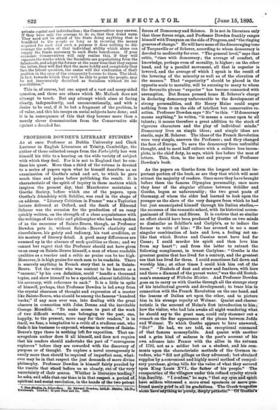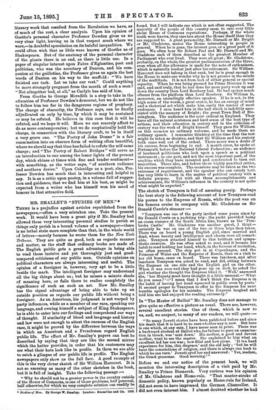PROFESSOR DOWDEN'S LITERARY STUDIES.* As at once Professor at Dublin
University and Clark Lecturer in English Literature at Trinity, Cambridge, the author of these collected essays from the Fortnightly has won himself his title to a hearing on the wide variety of subject with which they deal. For it is not to England that he con- fines his quest. More than a third of the volume is devoted to a series of papers upon what he himself describes as an examination of Goethe's mind and art, to which he gave much time and pains before publishing the result. It is characteristic of the spirit of inquiry in these matters which inspires the present day, that Manchester maintains a Goethe Society, before which one of the papers, upon Goethe's friendship with Schiller, was read in the shape of an address. " Literary Criticism in France" was a Taylorian lecture delivered at Oxford, and the death of Edmund Scherer was the occasion for the production of an essay quickly written, on the strength of a close acquaintance with the writings of the critic and philosopher who has been spoken of as the successor of Sainte-Beuve, though, as Professor Dowden puts it, without Sainte - Beuve's elasticity and cheerfulness, his gaiety and radiancy, his vast erudition, or his mastery of literary detail. A good many differences are summed up in the absence of such qualities as these; and we cannot but regret that the Professor should not have given us an essay on Sainte-Benve himself, a man of whose readable qualities as a teacher and a critic no praise can be too high. Moreover, it is high praise for such men to be readable. There is scarcely anything in French story that is not in Sainte- Beuve. Yet the writer who was content to be known as a "causenr," by his own definition, could "handle a thousand topics, and show himself to be a specialist, almost infallible in his accuracy, with reference to each." It is a little in spite of himself, perhaps, that Professor Dowden is led away from the crystal clearness of thought and expression of a master like Sainte-Beuve, who should be among the famous " hundred books," if any man ever was, into dealing with the great obscure in connection with John Donne and the inevitable George Meredith. "To make access to part of the work of two difficult writers, one belonging to the past, one, happily, to the present, more easy for' their readers," is in itself, we fear, a temptation to a critic of a studious oast, who finds it his business to expound, whereas in writers of Sainte- Benve's type there- is nothing left for exposition. That un- scrupulous author does it all himself, and does not require that his readers should undertake the part of " courageous explorers" before they are rewarded with the discovery of purpose or of thought. To explore a novel courageously is surely more than should be required of imperfect man, what- ever may be in that respect the just demands of more divine philosophy. Professor Dowden is himself fairly puzzled by the results that stand before ns so 'clearly, out of the very uncertainty of their source. Whither is literature tending ? he asks, and adds. hat our time is in that respeet a period of, spiritual and social revolution, in the hands of the two potent 4,fikeruilbwo. By Edward Bowden. Diatelins Edinbanrii. 1ldon: Xegan rand and 00. 1895- forces of Democracy and Science. It is not in literature only' that these forces reign, and Professor Dowden frankly ranges himself with Tennyson on the side of Progress, and " the ringing grooves of change." He will have none of the discouraging tone of Tocqueville or of Scherer, according to whom democracy is devoted to mediocrity for ever. `• The general level," says that critic, "rises with democracy; the average of comfort, of knowledge, perhaps even of morality, is higher; on the other hand, and by a parallel movement, all that is superior is lowered, and the average of which I speak is the result of the lowering of the minority as well as of the elevation of the masses." That "superiority" should be placed in the opposite scale to morality, will be amusing to many to whom the favourite phrase " superior " has become connected with assumption. But Renan pressed home M. Scherer's charge in declaring democracy unfavourable to the development of strong personalities, and Sir Henry Maine could augur nothing from it on the side of intellect but conservative re- action. Professor Dowden says " No " to this. " If democracy means anything," he writes, "it means a career open to all talents ; it means therefore a great addition to the stock of vigorous characters and the play of individual minds."
Democracy lives on simple ideas ; and simple ideas are sterile, says M. Scherer. The ideas of the French Revolution
were very simple, answers the Professor ; and they changed the face of Europe. To save the democracy from unfruitful thought, and to meet half culture with a culture less incom- plete, is the chief duty, he says, which lies before the man of letters. This, then, is the text and purpose of Professor Dowden's book.
As the papers on Goethe form the longest and most im- portant portion of the book, so are they that which will most attract the majority of readers. Once more they have brought before them the famous Olympian personality, once more they hear of the singular alliance between Schiller and Goethe, begun so unfavourably; the two great poets of Germany, of whom the elder had learned to look upon the younger as the slave of the very dangers from which he had but just emancipated himself through his Italian studies,— the excesses of the romantic school, with its historical accom- paniment of Storm and Stress. It is curious that so similar an effect should have been produced by Goethe on two minds so dissimilar as Schiller's and Carlyle's, as to induce the former to write of him : " He has aroused in use a most singular combination of hate and love, a feeling not un- like that which Brutus and Cassius must have had for Ca3sar ; I could murder his spirit and then love him from my heart "; and from the latter to extract the following compliment, in truest Carlylese : " Goethe is the greatest genius that has lived for a century, and the greatest ass that has lived for three. I could sometimes fall down and worship him ; at other times I could kick him out of the room." "Bushels of dust and straw and feathers, with here and there a diamond of the purest water," was the old Scotch. man's summary of Wilhelm Meister. And Professor Dowden goes on to carry us with Goethe through all the strange story of his intellectual growth and development; to trace him in connection with the French Revolution on the one hand, and the lessons of Italian art upon the other, and to picture him in his strange royalty at Weimar. Quaint and charac- teristic is the account of Heine's first introduction to him; bow the visitor, who had lain awake all night wondering what he should say to the great man, could only stammer out a remark on the fine appearance of the plums between Jedda and Weimar. To which Goethe appears to have answered, " So ?" He had, we are told, an exceptional command of that famous monosyllable. And quaint with another and a grim kind of sadness is the poet's account of his own advance into France with the allies in the autumn of 1792, not as a soldier but as a student, and his com- ments upon the characteristic methods of the German in- vaders, who " did not pillage as they advanced ; but obtained supplies by a convenient and highly moral method of compul- sory purchase, giving bills for the value of what they secured upon King Louis XVI., the father of his people." The exasperation of the villagers under this refined cruelty struck him, forcibly. " I oonfess," he says, " that my eyes and spirit have seldom witnessed a more cruel spectacle or more pro. found manly grief in all its gradations. The Greek-tragedies alone linveliniithing im Purely, cleiply/sithetio.' '43-oethes
literary work that resulted from the Revolution we have, as of much of the rest, a clear analysis. Upon his opinion of Goethe's personal character Professor Dowden gives us no very clear light, leaving us in that respect much where we were,—in doubtful speculation on its baleful inequalities. We could often wish that as little were known of Goethe as of Shakespeare. But of the anatomy of the personal character of the giants there is no end, as there is little use. In a paper of singular interest upon Fabre d'Eglantine, poet and politician, who was the secretary of Danton, and his com- panion at the guillotine, the Professor gives us again the last words of Danton on his way to the scaffold " We have finished our task. Let us take our rest." Could anything be more strangely pregnant from the mouth of such a man ? "Not altogether bad, at all," as Carlyle has said of him.
From Goethe to George Meredith is a step to take in the education of Professor Dowden's democrat, but we do not like to follow him too far in the dangerous regions of prophecy. The charge of obscurity, the Professor says, can be finally adjudicated on only by time, by which it may be sustained or may be refuted. He believes in this case that it will be refuted, and we hope it will. More we can scarcely affect to do as mere contemporaries; but we do emphatically hold the charge, in connection with the literary craft, to be in itself a very grave one. " The Poetry of John Donne" is a fair examination into an obscure form of writing often beautiful, where we should say that time has failed to refute the self-same charge ; and " The Poetry of Robert Bridges " will serve as an introduction to one among the lesser lights of the present day, which shines at times with fine and tender sentiment— with something, as the writer says, " of southern radiance and southern desire." Upon Coleridge as a poet, also, Pro- fessor Dowden has much that is interesting and helpful to say. It is as a critic upon poetry, in a volume full of sugges- tion and guidance, that we find him at his best, as might be expected from a writer who has himself won his meed of honour in that attractive field.



































 Previous page
Previous page